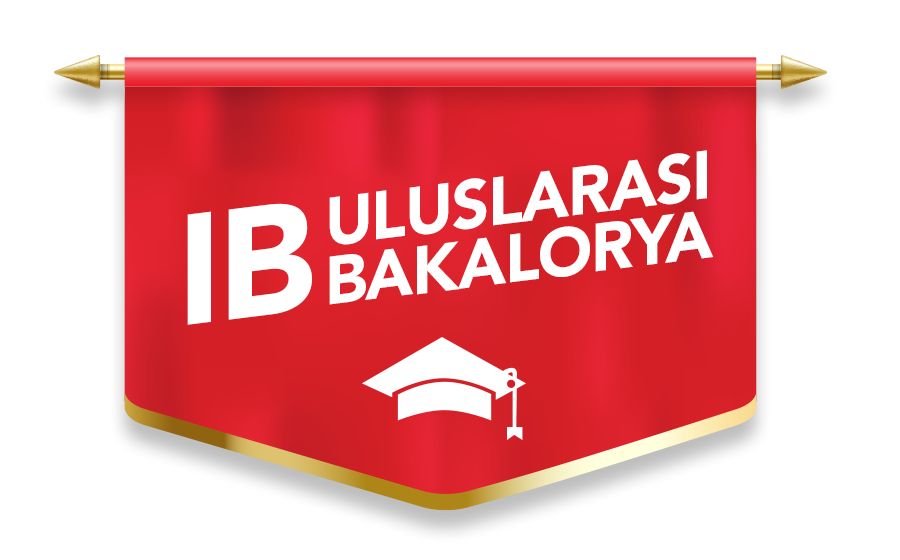
IB DP Programı
Özel Zafer Koleji, Mayıs 2017’de Uluslararası Bakalorya (IB) Dünya Okulu olarak yetkilendirilmiş ve Eylül 2017’de IB Diploma Programı (DP) derslerini başarıyla uygulamaya başlamıştır. IB DP, 16-19 yaş arası öğrenciler için tasarlanmış iki yıllık zorlu ve ilham verici bir akademik programdır. Program, uluslararası geçerliliği olan bir diploma ile sonuçlanır ve öğrencilerin eleştirel düşünme, sorgulama ve kişisel ifade yeteneklerini üst düzeyde geliştirmelerini hedefler. Özel Zafer Koleji’nde IB Diploma Programı, sadece bir eğitim süreci değil; gençlerimizin akademik ve kişisel başarılarının da teminatıdır.
Öğrencilerimiz şunları yapmaya teşvik edilir:
– Sorgulayıcı bir zihinle düşünmeye,
– Öğrenmeyi öğrenmeye ve bağımsız çalışmaya,
– Kendi kültürel kimliklerini sahiplenirken, farklı kültürlere saygı duymaya,
– Küresel bir vizyon geliştirmeye.
Öğrenci Profili
Özel Zafer Koleji, öğrencilerinin IB öğrenen profiline uygun olarak araştıran, bilgili, düşünen, etkili iletişim kuran, ilkeli, açık görüşlü, duyarlı, riske giren, dengeli ve yansıtıcı bireyler olmalarını amaçlar. Kurucumuz Ali Demir’in vizyonu ve Gazi Mustafa Kemal Atatürk’ün eğitim ilkeleri doğrultusunda yetiştirdiğimiz öğrencilerimiz, geleceğe güvenle yürümektedir.
Müfredat
Öğrencilerimiz, altı farklı ders grubundan birer ders seçerek aşağıdaki çekirdek bileşenleri tamamlarlar:
– Extended Essay (Bağımsız Araştırma Yazısı),
– Theory of Knowledge (Bilgi Kuramı),
– Creativity, Activity, Service (Yaratıcılık, Aktivite ve Hizmet).
Ders Grupları:
Grup 1: Turkish A Literature (HL veya SL)
Grup 2: English A Language and Literature (HL veya SL), English B (HL), French/German/Spanish Ab Initio (SL)
Grup 3: Economics (HL veya SL), Turkey in the 20th Century (SL), Psychology (HL veya SL)
Grup 4: Biology (HL veya SL), Physics (HL veya SL), Chemistry (HL veya SL), Computer Science (SL)
Grup 5: Mathematics: Analysis and Approaches (HL veya SL)
Grup 6: Visual Arts (HL veya SL)
Not: ESS dersi (Environmental Systems and Societies) okulumuzda sunulmamaktadır.
Değerlendirme ve Başarı Kriterleri
IB DP’de her ders 1 ile 7 arasında notlandırılır. Diploma alabilmek için öğrencilerimizin:
– Minimum 24 puan elde etmeleri,
– HL (Higher Level) derslerinden toplamda en az 12 puan kazanmaları,
– CAS yükümlülüklerini eksiksiz yerine getirmeleri gerekmektedir.
Özel Zafer Koleji IB sonuçları, her yıl dünya ortalamalarının üzerinde seyrederek, programın kalitesini ve öğrencilerimizin potansiyelini kanıtlamaktadır.
IB DP Kabul Şartları
IB Diploma Programı’na başvuracak öğrencilerin:
– 10. sınıfı başarıyla tamamlamış olmaları,
– Yıllık devamsızlık süresinin 10 günü aşmaması,
– Disiplin kuruluna sevk edilmemiş olmaları,
– Öğretmenlerden olumlu akademik ve davranışsal referans almaları,
– IB DP Koordinatörü ile bire bir görüşme yaparak ders seçimlerini tamamlamış olmaları,
– LGS sonuçlarına göre belirlenen yüzdelik dilim içerisinde yer almaları,
– Okulumuzun düzenlediği Essay Yazımı Sınavı’nda başarı göstermeleri,
– Öğrenci ve velinin IB DP Sözleşmesi’ni imzalayarak tüm yükümlülükleri kabul etmeleri gerekmektedir.
IB DP Programme – English
Özel Zafer College was authorized as an International Baccalaureate (IB) World School in May 2017 and began offering the IB Diploma Programme (DP) in September 2017. The IB DP is a rigorous and inspiring two-year academic programme designed for students aged 16–19, leading to an internationally recognized diploma. At Özel Zafer College, the IB Diploma Programme is not merely an academic journey; it is the foundation of our students’ future success. Our consistently outstanding IB results are a testament to the quality of our programme and the dedication of our students.
Our students are encouraged to:
– Think critically and ask meaningful questions;
– Master independent learning strategies;
– Embrace their cultural identity while respecting diversity;
– Develop a global perspective.
Learner Profile
At Özel Zafer College, we nurture students to embody the IB Learner Profile attributes: inquirers, knowledgeable, thinkers, communicators, principled, open-minded, caring, risk-takers, balanced, and reflective individuals. Guided by the vision of our founder, Ali Demir, and the principles of Mustafa Kemal Atatürk, our students are empowered to face the future with confidence.
Curriculum
Students select one subject from each of the six groups while completing three core components:
– Extended Essay (EE),
– Theory of Knowledge (TOK),
– Creativity, Activity, Service (CAS).
Subject Groups:
Group 1: Turkish A Literature (HL or SL)
Group 2: English A Language and Literature (HL or SL), English B (HL), French/German/Spanish Ab Initio (SL)
Group 3: Economics (HL or SL), Turkey in the 20th Century (SL), Psychology (HL or SL)
Group 4: Biology (HL or SL), Physics (HL or SL), Chemistry (HL or SL), Computer Science (SL)
Group 5: Mathematics: Analysis and Approaches (HL or SL)
Group 6: Visual Arts (HL or SL)
Note: ESS (Environmental Systems and Societies) is not offered at Özel Zafer College.
Assessment and Success Criteria
Each IB DP subject is graded on a scale from 1 to 7. To be awarded the diploma, students must:
– Achieve a minimum of 24 points overall,
– Gain at least 12 points from HL subjects,
– Successfully complete CAS requirements.
Our IB Diploma results consistently surpass global averages, affirming the excellence of our programme and the potential of our students.
IB DP Admission Requirements
To enroll in the IB Diploma Programme at Özel Zafer College, students must:
– Successfully complete Grade 10,
– Have no more than 10 days of absence during the academic year,
– Have no disciplinary record,
– Receive positive academic and behavioral recommendations from teachers,
– Complete the course selection process with the IB DP Coordinator,
– Achieve a qualifying LGS (national high school entrance exam) score,
– Pass the School’s Essay Writing Assessment,
– Have both student and parent sign the IB DP Agreement, acknowledging programme commitments.

